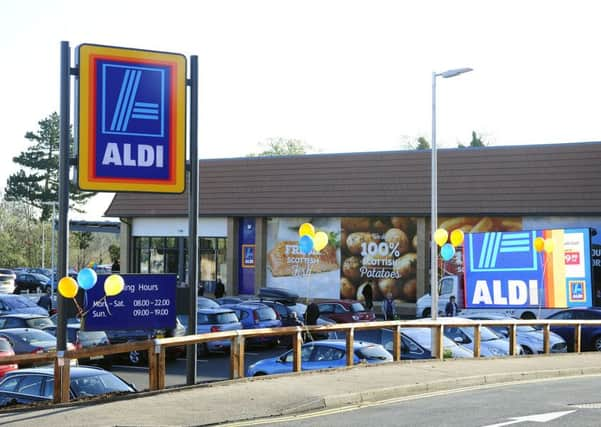Discount grocers' sales rocket amid rising inflation
This article contains affiliate links. We may earn a small commission on items purchased through this article, but that does not affect our editorial judgement.


The two German-owned supermarket groups reached a joint record market share of 12 per cent as inflation put an extra £27 on the grocery bills of households over the past 12 weeks, Kantar Worldpanel figures showed.
Aldi and Lidl’s joint sales rose almost 20 per cent year-on-year as 62 per cent of the UK population shopped in either of them over the past three months, up from 58 per cent.
Advertisement
Hide AdAdvertisement
Hide AdAldi sales lifted 19.8 per cent, while Lidl was up 18.3 per cent. Iceland also grew well ahead of the market, increasing sales by 8.6 per cent and attracting 380,000 more shoppers to boost its share to 2.2 per cent.
Overall sales grew 3.8 per cent year on year, the market’s best performance since September 2013. Kantar Worldpanel said all 10 UK supermarket groups saw sales increase, boosted by higher prices as inflation continues.
Chris Hayward, consumer specialist at Kantar, said: “The big four have collectively grown by 1.6 per cent overall, while Aldi and Lidl together grew at their fastest rate since January 2015.
“Consumers are starting to feel the pinch as prices continue to rise, with the average household spending an additional £27 on groceries during the past 12 weeks.
“That may not seem like much, but if inflation continues at its current rate over the course of a year, that would mean an extra £119 spent on groceries per household.”
Advertisement
Hide AdAdvertisement
Hide AdHayward added that the “rapid growth” of Aldi and Lidl was not just about inflation but “also the effect of more of the UK population shopping in their stores more often, as they both continue a programme of store openings”.
Both discounters had also developed very successful own-label lines, Hayward said. “These played well to customers’ desire for value, while
also encouraging them to trade up to more expensive products,” he said. Kantar said consumers also bought more healthy foods after the excesses of Easter, when the nation consumed some £325 million worth of Easter eggs.
By volume, sales of mineral water were up 7.4 per cent, eggs 5.1 per cent and fresh produce by 2.1 per cent, while sugar sales fell 5.6 per cent.
Meanwhile, figures from analyst Nielsen show Tesco recording the fastest-growing sales of the big four supermarket giants for the second consecutive month.
Tesco increased sales by 2.2 per cent over the 12 weeks to 20 May, ahead of the 1.4 per cent for Morrisons, and 1.2 per cent for Sainsbury’s. Asda, owned by Wal-Mart of the United States, saw sales dip 0.1 per cent.
Mike Watkins, Nielsen’s UK head of retailer and business insight, said: “Tesco’s re-focus on the customer and their changing needs, such as simplifying ranges and promotions, has meant they’ve not only attracted new shoppers but encouraged them to visit more often.”
Advertisement
Hide AdAdvertisement
Hide AdHe added: “The return of inflation has helped supermarket grow sales, but the challenge for the summer is to sustain this by encouraging shoppers to put more items into the basket.”